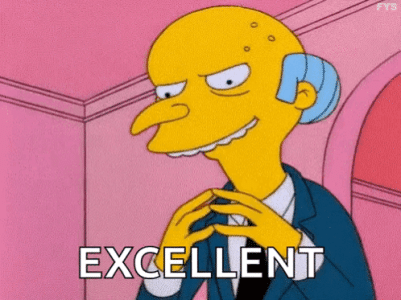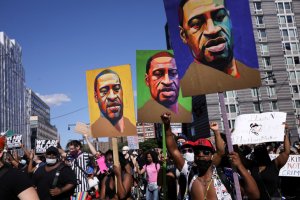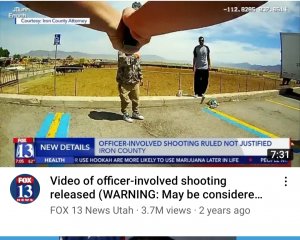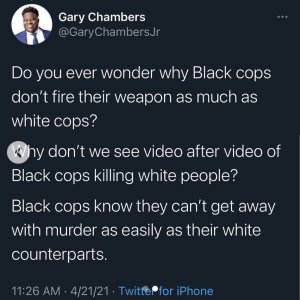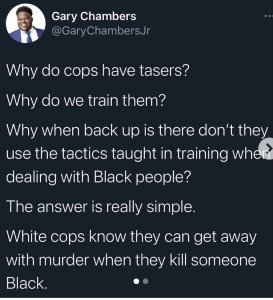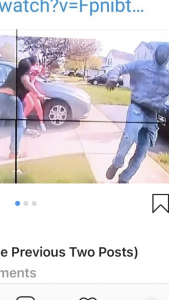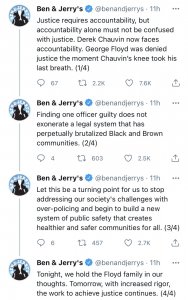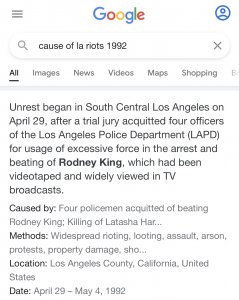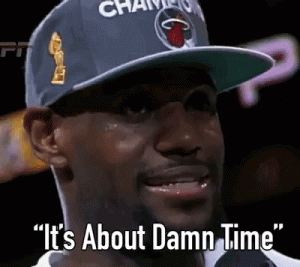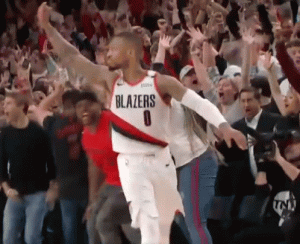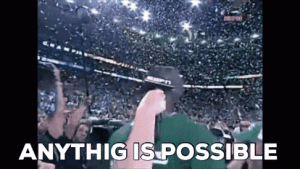- 28,545
- 54,180
Earlier, I posted about my company having an all employee townhall meeting. Not all of these questions/comments were read. WOW.
They sent us a transcript of all the questions/comments that were made in the meetings:
“I am incredibly frustrated by the tone, content, responses, and structure of this call.“
They sent us a transcript of all the questions/comments that were made in the meetings:
“I am incredibly frustrated by the tone, content, responses, and structure of this call.“
To white people - going to every black person you know to apologize is not enough... honestly we may not really care too much for your white tears - use your privielge to speak to your family, freinds, partners - post on social media, start dialogue with the white people you know, create conversations with them. What are you doing on a personal level when people of color, black people are not around or present.
Habitat needs to be courageous and take a stand. This harkens back to our roots. Saying Black Lives Matter is not enough. We need to say more, do more.
How is Habitat planning to publicly lift up and center black voices at this time? What actions will Habitat commit to long-term to address the ways we (consciously and unconsciously) perpetuate systemic racial injustice and white supremacy?
Does Habitat plan to provide additional time off for staff who want to participate in peaceful protests AND/OR who simply need emotional rest?
I am pleased to hear that Habitat is working on diversity and inclusion plans. I have sat on teams where person after person hired has been white, and I have been the only person of color on my team. I would also recommend that there is more transparency in salary ranges to ensure that salaries are based on the duties associated with the position and are equitable across race and gender. It has appeared in the past that some people who are newly hired and with less experience have been paid more than those of color in similar positions. Once we are in a more secure situation, are their plans in place to evaluate salaries to make sure they are fair and are their plans to make general salary ranges available for position families?
Much like how we believe housing is foundational for forging a path out of poverty, violence toward African Americans who represent a significant portion of the people we serve in the US undermines the value of the work we do. What good is housing if this violence and deep seeded racial inequality continues? We are accountable to the people we serve and to operate with integrity and courage to make a stand with them. Habitat was birthed out of racial equality, we stood for that then and we stand for it now. We must continue to adapt this same voice to a changing environment. How does HFHI expect to do that?
I would like Habitat to acknowled the ways we fall short in empowering and uplifting its black staff. And once acknowledged, how can we do this better?
Dr. Martin Luther King said "We must recognize that we can't solve our problem now until there is a radical redistribution of economic and political power." In Memphis, just before he was killed, he said "the whole structure of American life must be changed." In this short time, we have seen the whole structure of American life change. The pandemic has shined a glaring spotlight on the problem. How can we be an active, forceful part of the solution, bringing people together to bring HOPE? Can we be louder on the need for equity?
Comment: I think we also need to acknowledge that as upsetting, sad, outraging, infurtating as all this is, our brothers and sisters who are people of color have been dealing with all these emotions (and more) for +400 years. I can't even imagine their emotional burden. Let's make this 100% about people of color by not dominating the conversation with what white people are feeling right now. It's also important but white people ought to be leveraging priviledge to amplify voices of POC by not talking about ourselves.
I live in Houston, TX. My heart hurts anytime a person of color is senselessly killed, but this hits home. I have personally rubbed shoulders with George Floyd at various social outings. I am not OKAY and I cannot fake a smile anywhere, let alone at work. How is Habitat, as an organization, supporting employees who are simply traumarized and emotionally tired.
Does Habitat plan to specifically denounce police brutality?
Comment: Participating in Black Out Tuesday is not meaningful action. While these posts may be well-intended, several activists and influencers have pointed out that posting a blank black image with a bunch of tags clogs up critical channels of information and updates. It comes across as an empty gesture
this is a comment - please understand and take accountablity for the fact that the answer "We don't know...it will take some time to figure out" is the same excuse that has been used for the past 3 years in regards to the diversity & inclusion agenda at Habitat. ERG's are not enough, as person of color I'm tired of talking - we can figure out a strategic plans in a month, we can create a new job position within a few weeks with no funding - but in regards to race we still don't really know? We can't believe what you say and we dont see what you do.
Mental health is a valid reason to use sick leave
Managers need to be held accountable to their black staff. Regularly checking in to see if they have a need that hasn't been met and not just when we have a George Floyd incident, but regularly doing this to ensure DEI is being accomplished.
There is a history of silence in Habitat when crisis or flashpoint related to race happen in US. Some of your colleagues have directly experienced a death similar to George Floyd and those national headline incidents were not acknowledged by Habitat.
Time and time again, we ask people to share their stories and open up wounds for the sake of teaching others in the organization. To what end? What is the plan? Where are the organization's actionable items?
How do we balance the need to leverage this horrific tragedy for the social changes we all know need to occur in this country (and world) while ensuring additional innocent lives are not lost by the collateral damage of our collective outrage and despair? What responsibility do we accept as a ministry to drive critical social changes while not inadvertently stoking the fires that still burn in cities across the country?
Is there any plan to make our leadership team more diverse ? I konw we have done some work, but the reality is Habitat does not look like the families we serve. For instance, what about hiring someone to focus on Diversity and Inclusion? Adrienne shouldnl't be the only senior leader who can speak from a black perspective.
What's the "real" reason why we aren't more bold with our external messaging and leveraging our brand to ignite more conversations in our sector? We've have fallen short yet again...
With response saying "housing for' everyone'" feels dilluted and a bit detracting around what we know about housing and race and opportunity - like 'all lives matter' vs 'black lives matter'. and individual introspection is important - but how are our leaders and network willing to call our impact on POC? how can we say our approach and model is meant to redress redlining? how can we say our policy and adv work is meant to dismantle racist systems? that cant be done individually. that requires naming it and giving stronger direction and prioritization from Habitat's leaders
In my role, I visit a lot of different Habitat builds and meet with a lot of volunteers and affilaite staff. More than a handful of times, I have heard volunteers and sometimes affiliate staff say things that they clearly don't realize are offensive and stem from racism. For example, referring to a Black homeowner or staff person as "so articulate." While I feel personally okay speaking up, I do not know how I should do this while also representing HFHI. I'd love more official guidance on how to deal with these situations.
I have heard many comments regarding leaders being uncomfortable to speak about racial issues. Our work uses images of black and brown people freely and is responsible for addressing these issues and not cherry picking
Apart from building communities and bringing races together through the work that we do for the world to see, how is Habitat planning to shift the paradigm internally and ensure that race is not used to perpretuate stereotypes, for example, how often we showcase black donors instead of just showcasing black homeowners in our social media, the way we present our work, perpetuates the racial divide if we don't change our culture internally and seek activelly to identify our own biases.
What are the accountability measures to affiliates if its found they are practicing bias/racist practices? What pathway do the black employees/homewoners have to voice their concerns. If the leadership is more than 90% white how do we acount for those power dynamics? We heard an example from black employees t an affiliate who weren't egtting better fixtures, even though they were in the budget becaue as the affiliate leader said "they are getting a house anyway". How is that person still an affiliate leader? What weight do we give the ability to bring in donors over bad behavior.
Very disappointing so far..
When we talk about external consultants and vendors, I think an action step we could take is to invest in vendors who also support diversity and equity in their staffing. I recently went through a training and when I checked out the company's website, it was all white faces. Something is wrong that in 2020, this vendor did not appear to have any Black or brown leaders. Let's stop spending our money with these vendors.
This is a lot of talk and numbers without having clearly defined the problem explicitly within HFHI.(As a DE&I instructor and long-time Habitat employee, I'm personally frustrated that we (HFHI) haven't adequately named the white privelege problem that exists in our organization. At our best, we transcend it; at our worst, we uncouciously replicate it. Can we please name it?)
Data shows that African American women are dramatically the most disadvantaged in our US culture and at Habitat. What is Habitat doing to address the barriers African American women face?
Inability to pay bonds results in higher rates of conviction, longer sentences, loss of housing and jobs, separation of families and lost custody of children - as a housing organization, this is a way to contribute to the communities we claim to serve.(In addition to advocacy and using its voice, does Habitat intend to take any action items, such as donating to community bond funds for people charged with crimes/who are impacted by structural violence in Atlanta? Atlanta, where HFHI is headquartered, is hurting right now. )
Even when we can build again, how can we "Build together" and insure that we are avoiding paternalism and "building for" instead of "building with?" How many African-Americans have been mistaken for homeowners on a build site, even our own leadership?
Can we PLEASE stop saying "integrate" or "embed" when it comes to race? Our founders didn't.....
Maaaan, I don’t want to let leadership totally off the hook (cause we can all do better) but this conversation, the ERGs, and our mission are all examples of how Habitat is working to be more inclusive, which makes the world and the organization better. This is not the time to pat ourselves on the back, but we shouldn’t let the justified frustration and hurt take away from some of the progress made (noting again we all, especially those in power, can do more).
So the stats are worse 50 years after the fair lendin act was passed. and we've been building for most of those 50 years. if we do not change our approach to focus more on the foundation of systemic historical racism and injustice, our impact will continue to be too marginal to actually help push change. we will keep building houses for some people in a system that racist at its core
what is the goal of ppl of color as far as percentage in hfhi. the us demographic is 12.6%, and we are 29% i think you said. is it 30% 50% or have we exceeded the goal?
Are there any measures in place to ensure that people of color are actually hired? I understand that having a more diverse applicant pool can help, but studies have shown that between white and black applicants of similar standing, white applicants are more likely to be hired under the guise that the white applicant is more qualified
One way to put your "money where your mouth is," to be proactive in healing the wounds of discrimination in housing would be to specifically choose to build, repair and removate in African American neighborhoods by partnering with local African American organizations through every affiliate or in every state.. It's important that the work be done and without a "savior" mentality, so the partnerships are key.
This defensiveness again is disappointing. It's not about numbers, it's about how PoC feel within the workspace. So again, to say, we see you and we feel you. And as leadership continues to make changes - what truly matters is how staff feel those. And if they don't, that should tell leadership something. But they can't say "we are doing work" becuase intent and impact are so different.
Habitat needs to be courageous and take a stand. This harkens back to our roots. Saying Black Lives Matter is not enough. We need to say more, do more.
How is Habitat planning to publicly lift up and center black voices at this time? What actions will Habitat commit to long-term to address the ways we (consciously and unconsciously) perpetuate systemic racial injustice and white supremacy?
Does Habitat plan to provide additional time off for staff who want to participate in peaceful protests AND/OR who simply need emotional rest?
I am pleased to hear that Habitat is working on diversity and inclusion plans. I have sat on teams where person after person hired has been white, and I have been the only person of color on my team. I would also recommend that there is more transparency in salary ranges to ensure that salaries are based on the duties associated with the position and are equitable across race and gender. It has appeared in the past that some people who are newly hired and with less experience have been paid more than those of color in similar positions. Once we are in a more secure situation, are their plans in place to evaluate salaries to make sure they are fair and are their plans to make general salary ranges available for position families?
Much like how we believe housing is foundational for forging a path out of poverty, violence toward African Americans who represent a significant portion of the people we serve in the US undermines the value of the work we do. What good is housing if this violence and deep seeded racial inequality continues? We are accountable to the people we serve and to operate with integrity and courage to make a stand with them. Habitat was birthed out of racial equality, we stood for that then and we stand for it now. We must continue to adapt this same voice to a changing environment. How does HFHI expect to do that?
I would like Habitat to acknowled the ways we fall short in empowering and uplifting its black staff. And once acknowledged, how can we do this better?
Dr. Martin Luther King said "We must recognize that we can't solve our problem now until there is a radical redistribution of economic and political power." In Memphis, just before he was killed, he said "the whole structure of American life must be changed." In this short time, we have seen the whole structure of American life change. The pandemic has shined a glaring spotlight on the problem. How can we be an active, forceful part of the solution, bringing people together to bring HOPE? Can we be louder on the need for equity?
Comment: I think we also need to acknowledge that as upsetting, sad, outraging, infurtating as all this is, our brothers and sisters who are people of color have been dealing with all these emotions (and more) for +400 years. I can't even imagine their emotional burden. Let's make this 100% about people of color by not dominating the conversation with what white people are feeling right now. It's also important but white people ought to be leveraging priviledge to amplify voices of POC by not talking about ourselves.
I live in Houston, TX. My heart hurts anytime a person of color is senselessly killed, but this hits home. I have personally rubbed shoulders with George Floyd at various social outings. I am not OKAY and I cannot fake a smile anywhere, let alone at work. How is Habitat, as an organization, supporting employees who are simply traumarized and emotionally tired.
Does Habitat plan to specifically denounce police brutality?
Comment: Participating in Black Out Tuesday is not meaningful action. While these posts may be well-intended, several activists and influencers have pointed out that posting a blank black image with a bunch of tags clogs up critical channels of information and updates. It comes across as an empty gesture
this is a comment - please understand and take accountablity for the fact that the answer "We don't know...it will take some time to figure out" is the same excuse that has been used for the past 3 years in regards to the diversity & inclusion agenda at Habitat. ERG's are not enough, as person of color I'm tired of talking - we can figure out a strategic plans in a month, we can create a new job position within a few weeks with no funding - but in regards to race we still don't really know? We can't believe what you say and we dont see what you do.
Mental health is a valid reason to use sick leave
Managers need to be held accountable to their black staff. Regularly checking in to see if they have a need that hasn't been met and not just when we have a George Floyd incident, but regularly doing this to ensure DEI is being accomplished.
There is a history of silence in Habitat when crisis or flashpoint related to race happen in US. Some of your colleagues have directly experienced a death similar to George Floyd and those national headline incidents were not acknowledged by Habitat.
Time and time again, we ask people to share their stories and open up wounds for the sake of teaching others in the organization. To what end? What is the plan? Where are the organization's actionable items?
How do we balance the need to leverage this horrific tragedy for the social changes we all know need to occur in this country (and world) while ensuring additional innocent lives are not lost by the collateral damage of our collective outrage and despair? What responsibility do we accept as a ministry to drive critical social changes while not inadvertently stoking the fires that still burn in cities across the country?
Is there any plan to make our leadership team more diverse ? I konw we have done some work, but the reality is Habitat does not look like the families we serve. For instance, what about hiring someone to focus on Diversity and Inclusion? Adrienne shouldnl't be the only senior leader who can speak from a black perspective.
What's the "real" reason why we aren't more bold with our external messaging and leveraging our brand to ignite more conversations in our sector? We've have fallen short yet again...
With response saying "housing for' everyone'" feels dilluted and a bit detracting around what we know about housing and race and opportunity - like 'all lives matter' vs 'black lives matter'. and individual introspection is important - but how are our leaders and network willing to call our impact on POC? how can we say our approach and model is meant to redress redlining? how can we say our policy and adv work is meant to dismantle racist systems? that cant be done individually. that requires naming it and giving stronger direction and prioritization from Habitat's leaders
In my role, I visit a lot of different Habitat builds and meet with a lot of volunteers and affilaite staff. More than a handful of times, I have heard volunteers and sometimes affiliate staff say things that they clearly don't realize are offensive and stem from racism. For example, referring to a Black homeowner or staff person as "so articulate." While I feel personally okay speaking up, I do not know how I should do this while also representing HFHI. I'd love more official guidance on how to deal with these situations.
I have heard many comments regarding leaders being uncomfortable to speak about racial issues. Our work uses images of black and brown people freely and is responsible for addressing these issues and not cherry picking
Apart from building communities and bringing races together through the work that we do for the world to see, how is Habitat planning to shift the paradigm internally and ensure that race is not used to perpretuate stereotypes, for example, how often we showcase black donors instead of just showcasing black homeowners in our social media, the way we present our work, perpetuates the racial divide if we don't change our culture internally and seek activelly to identify our own biases.
What are the accountability measures to affiliates if its found they are practicing bias/racist practices? What pathway do the black employees/homewoners have to voice their concerns. If the leadership is more than 90% white how do we acount for those power dynamics? We heard an example from black employees t an affiliate who weren't egtting better fixtures, even though they were in the budget becaue as the affiliate leader said "they are getting a house anyway". How is that person still an affiliate leader? What weight do we give the ability to bring in donors over bad behavior.
Very disappointing so far..
When we talk about external consultants and vendors, I think an action step we could take is to invest in vendors who also support diversity and equity in their staffing. I recently went through a training and when I checked out the company's website, it was all white faces. Something is wrong that in 2020, this vendor did not appear to have any Black or brown leaders. Let's stop spending our money with these vendors.
This is a lot of talk and numbers without having clearly defined the problem explicitly within HFHI.(As a DE&I instructor and long-time Habitat employee, I'm personally frustrated that we (HFHI) haven't adequately named the white privelege problem that exists in our organization. At our best, we transcend it; at our worst, we uncouciously replicate it. Can we please name it?)
Data shows that African American women are dramatically the most disadvantaged in our US culture and at Habitat. What is Habitat doing to address the barriers African American women face?
Inability to pay bonds results in higher rates of conviction, longer sentences, loss of housing and jobs, separation of families and lost custody of children - as a housing organization, this is a way to contribute to the communities we claim to serve.(In addition to advocacy and using its voice, does Habitat intend to take any action items, such as donating to community bond funds for people charged with crimes/who are impacted by structural violence in Atlanta? Atlanta, where HFHI is headquartered, is hurting right now. )
Even when we can build again, how can we "Build together" and insure that we are avoiding paternalism and "building for" instead of "building with?" How many African-Americans have been mistaken for homeowners on a build site, even our own leadership?
Can we PLEASE stop saying "integrate" or "embed" when it comes to race? Our founders didn't.....
Maaaan, I don’t want to let leadership totally off the hook (cause we can all do better) but this conversation, the ERGs, and our mission are all examples of how Habitat is working to be more inclusive, which makes the world and the organization better. This is not the time to pat ourselves on the back, but we shouldn’t let the justified frustration and hurt take away from some of the progress made (noting again we all, especially those in power, can do more).
So the stats are worse 50 years after the fair lendin act was passed. and we've been building for most of those 50 years. if we do not change our approach to focus more on the foundation of systemic historical racism and injustice, our impact will continue to be too marginal to actually help push change. we will keep building houses for some people in a system that racist at its core
what is the goal of ppl of color as far as percentage in hfhi. the us demographic is 12.6%, and we are 29% i think you said. is it 30% 50% or have we exceeded the goal?
Are there any measures in place to ensure that people of color are actually hired? I understand that having a more diverse applicant pool can help, but studies have shown that between white and black applicants of similar standing, white applicants are more likely to be hired under the guise that the white applicant is more qualified
One way to put your "money where your mouth is," to be proactive in healing the wounds of discrimination in housing would be to specifically choose to build, repair and removate in African American neighborhoods by partnering with local African American organizations through every affiliate or in every state.. It's important that the work be done and without a "savior" mentality, so the partnerships are key.
This defensiveness again is disappointing. It's not about numbers, it's about how PoC feel within the workspace. So again, to say, we see you and we feel you. And as leadership continues to make changes - what truly matters is how staff feel those. And if they don't, that should tell leadership something. But they can't say "we are doing work" becuase intent and impact are so different.
Last edited:











